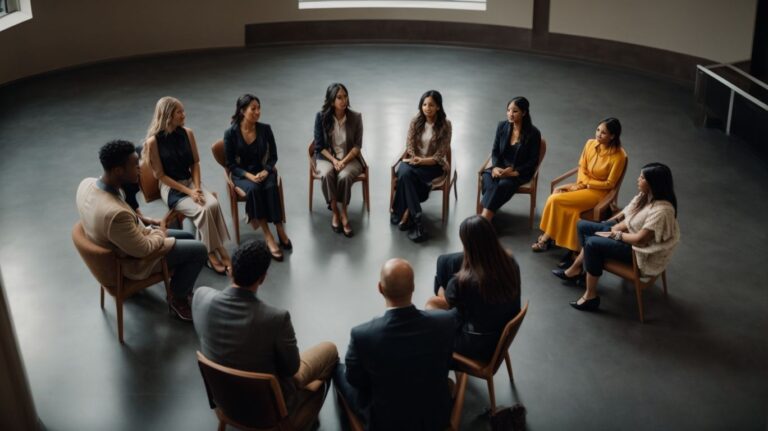Are you intrigued by the minds of criminals and the motivations behind their behavior? Have you ever considered a career in criminal psychology?
In this article, we will delve into the world of criminal psychology, exploring what it is, why pursuing a degree in this field could be beneficial, and the wide range of careers you can have with a criminal psychology degree. From criminal profiler to victim advocate, there are numerous opportunities available for those with a passion for understanding criminal behavior.
Join us as we uncover the skills and qualifications needed for these careers, and learn how you can best prepare for a successful career in criminal psychology.
Contents
- 1 What is Criminal Psychology?
- 2 Why Pursue a Degree in Criminal Psychology?
- 3 What Careers Can You Have with a Criminal Psychology Degree?
- 4 What Skills and Qualifications are Needed for These Careers?
- 5 How to Prepare for a Career in Criminal Psychology?
- 6 Frequently Asked Questions
- 6.1 1. What types of careers are available with a criminal psychology degree?
- 6.2 2. How does a criminal psychology degree prepare me for a career in law enforcement?
- 6.3 3. Can I work in victim advocacy with a criminal psychology degree?
- 6.4 4. What research opportunities are available with a criminal psychology degree?
- 6.5 5. How can I use a criminal psychology degree in the field of corrections?
- 6.6 6. Are there any alternative career options for those with a criminal psychology degree?
What is Criminal Psychology?
Criminal psychology, also known as forensic psychology, is a branch of psychology that focuses on understanding criminal behavior, mental processes, and the interactions within the legal system.
It plays a critical role in forensic investigations by applying psychological principles to criminal cases, aiding law enforcement in profiling suspects and understanding motives behind crimes.
Psychologists in this field delve deep into the study of criminal minds, analyzing patterns of behavior, thoughts, and emotions to create profiles that can assist in solving crimes.
Criminal psychology is essential in the criminal justice system, providing expert testimony in court proceedings, evaluating competency, and determining the mental state of offenders.
Why Pursue a Degree in Criminal Psychology?
Pursuing a degree in criminal psychology offers a unique opportunity to delve into the complexities of criminal behavior, contribute to the legal system, and explore diverse career paths within the field.
One of the key advantages of acquiring a degree in criminal psychology is the wide array of fulfilling careers it opens up. Whether working as a criminal profiler, forensic psychologist, or correctional counselor, individuals with this specialized knowledge play crucial roles in the criminal justice system. By understanding the intricacies of criminal behavior, professionals in this field can not only assist law enforcement in solving crimes but also provide rehabilitative support to offenders and contribute to creating a more just and safe society.
What Careers Can You Have with a Criminal Psychology Degree?
A criminal psychology degree opens doors to various rewarding careers, such as forensic psychologist, victim advocate, jury consultant, and correctional counselor, as indicated by the Bureau of Labor Statistics.
Forensic psychologists primarily work with law enforcement agencies, providing insights into criminal behavior to aid in investigations and court proceedings. Victim advocates play a crucial role in supporting and guiding individuals impacted by crime through legal processes and emotional distress. Similarly, jury consultants assist legal teams by helping select impartial jurors through psychological analysis. Correctional counselors work within the criminal justice system to provide therapy and rehabilitation services to inmates.
Criminal Profiler
As a criminal profiler, individuals work closely with law enforcement agencies like the FBI to analyze criminal behavior, create offender profiles, and aid in investigations.
Criminal profilers utilize a combination of psychology, criminology, and forensic science to delve deep into the motives and patterns behind crimes. By examining crime scenes, victimology reports, and witness statements, they develop profiles that provide key insights into the characteristics and possible identity of offenders. These profiles are invaluable tools for law enforcement to narrow down suspects, prioritize leads, and strategize their investigations. Collaborating closely with the FBI and other agencies, criminal profilers contribute their expertise to high-profile cases, aiding in solving complex crimes and bringing perpetrators to justice.
Forensic Psychologist
Forensic psychologists specialize in applying psychological principles to legal issues, offering assessments, therapy, and support, with a focus on mental health and culturally sensitive practices, including interactions with diverse populations like African Americans.
They play a crucial role in courtrooms, providing expert testimony, evaluating mental competency, and assessing the psychological impact of crimes. Forensic psychologists assist in criminal investigations, helping law enforcement understand the behavior and motivations of perpetrators. Their work extends beyond individual cases to shaping policy recommendations and interventions to improve the legal system’s response to mental health issues. Recognizing the unique experiences of different cultural groups, they strive to ensure fair treatment and accurate assessments for individuals from diverse backgrounds.
Correctional Counselor
Correctional counselors play a vital role in facilitating rehabilitation programs, providing counseling services to inmates, and addressing reintegration challenges, with a focus on promoting positive outcomes, including tailored support for Latina/Latinos individuals.
These professionals work closely with inmates to develop personalized treatment plans that target specific needs and challenges faced by Latina/Latinos populations, such as language barriers, cultural differences, and lack of community support. Through individual and group counseling sessions, correctional counselors create a safe space for inmates to address underlying issues contributing to their incarceration and establish coping mechanisms for successful reintegration into society.
They collaborate with other staff members, such as social workers and psychologists, to ensure comprehensive care and support for the holistic well-being of inmates. By advocating for the unique needs of Latina/Latinos individuals within the criminal justice system, correctional counselors help to break down barriers to rehabilitation and enable this community towards positive change.
Victim Advocate
Victim advocates offer crucial support to individuals impacted by crimes, ensuring their rights are protected, providing emotional assistance, and guiding them through the complexities of trauma recovery.
These dedicated professionals play a pivotal role in the criminal justice system, bridging the gap between victims and legal processes. They work tirelessly to ensure that victims understand their rights and have a voice in the often overwhelming legal proceedings. Victim advocates offer a compassionate ear, enableing victims to navigate the emotional turmoil that can accompany trauma. By providing resources, information, and referrals, these advocates are instrumental in helping individuals rebuild their lives after experiencing a crime.
Law Enforcement Officer
Law enforcement officers serve as frontline professionals dedicated to enforcing laws, protecting communities, and engaging in community policing initiatives to build trust and enhance public safety.
Police officers play a crucial role in maintaining law and order within society. Their responsibilities encompass a wide array of duties, including responding to emergency calls, conducting investigations, and ensuring public safety during various events and gatherings.
Community policing
is a proactive approach adopted by law enforcement officers to collaborate closely with residents, businesses, and other stakeholders in a community.
This strategy involves fostering strong relationships, exchanging information, and addressing concerns to prevent crime and address issues at the grassroots level. By incorporating community policing strategies, law enforcement officers can gain valuable insights, enhance trust, and promote a sense of shared responsibility for safety among community members.
Legal Consultant
Legal consultants provide expert advice on legal matters, assist in court proceedings, and offer insights into criminal minds and behaviors to support legal strategies and decision-making processes.
Legal consultants play a crucial role in navigating the complex landscape of legal systems by interpreting laws, regulations, and statutes for their clients. They often act as liaisons between individuals and the legal system, ensuring that their clients understand their rights, responsibilities, and options.
These experts delve into the psychology of criminal minds, analyzing behaviors and motives to help build strong cases and anticipate possible defenses. Their deep understanding of human behavior in illegal contexts can be instrumental in developing effective legal tactics.
Jury Consultant
Jury consultants aid legal teams in the jury selection process, analyze potential jurors, and provide critical incident stress debriefing services to support jurors’ mental well-being during trials.
Utilizing intricate methodologies and behavioral analysis, jury consultants play a pivotal role in assisting legal teams in understanding the juror’s psyche and biases. Through comprehensive research and profiling, they help identify potential jurors that may be favorable or unfavorable to the case at hand, ensuring a fair and balanced jury selection. These consultants offer critical incident stress debriefing sessions to jurors, helping them cope with the emotional toll of trial proceedings and enabling them to focus on delivering impartial verdicts.
Researcher
Researchers in criminal psychology explore crime prevention strategies, evaluate intervention programs, and contribute valuable insights to inform evidence-based practices within the criminal justice system.
These professionals play a crucial role in identifying risk factors for criminal behavior, developing effective prevention measures strategies, and assessing the effectiveness of various intervention programs.
By conducting thorough research and program evaluations in this field, researchers help to tailor crime prevention efforts to specific populations and circumstances, ultimately leading to more targeted and successful outcomes.
Their work also serves to bridge the gap between theoretical knowledge and practical implementation, ensuring that evidence-based practices are continuously refined and adapted to address the evolving challenges in the criminal justice landscape.
Academic Professor
Academic professors in criminal psychology play a pivotal role in shaping future professionals, conducting research, and advancing educational programs accredited by organizations like the American Board of Professional Psychology.
Within the realm of criminal psychology, the responsibilities of these esteemed educators extend beyond traditional teaching roles. College professors in this field not only impart knowledge but also mentor students, guide them in practical applications of theories, and foster critical thinking skills crucial for success in the complex world of forensic psychology.
Academic professors are instrumental in driving research initiatives that contribute to the evolution of the field. Their scholarly work sheds light on emerging trends, challenges, and solutions in criminal behavior analysis, ultimately benefiting both academia and professional practice.
Private Investigator
Private investigators specializing in criminal matters gather evidence, interview witnesses, and collaborate with agencies like the CIA to conduct covert operations, supporting legal cases with vital testimony and information.
One of the key roles of private investigators in criminal contexts is the meticulous collection of evidence that can be crucial in building a case. Whether it’s scrutinizing financial records, examining digital footprints, or analyzing surveillance footage, these professionals leave no stone unturned in uncovering valuable clues.
In terms of witness interviews, private investigators excel in extracting accurate and reliable testimonies that can significantly influence the outcome of a legal proceeding. They possess the skills to ask probing questions, gain trust, and elicit detailed information that is essential for building a comprehensive case.
Collaboration with intelligence agencies like the CIA adds a whole new dimension to their work, allowing them access to specialized resources and expertise that can enhance investigations. By working in tandem with such agencies, private investigators can tap into a wealth of knowledge and intelligence to solve even the most complex criminal cases.
What Skills and Qualifications are Needed for These Careers?
To excel in careers related to criminal psychology, individuals require strong analytical skills, a deep understanding of the criminal justice system, and excellent communication abilities to interact effectively with diverse stakeholders.
Furthermore,
- critical thinking and problem-solving skills are essential to assess complex situations and develop psychological profiles of offenders.
- Plus academic qualifications in psychology or criminology, practical experience through internships or work placements can provide valuable insights into real-world applications.
Professionals in this field must also possess
- empathy and emotional intelligence to understand the motivations behind criminal behavior and build rapport with individuals from diverse backgrounds.
- Knowledge of forensic psychology techniques and research methodologies is crucial for conducting assessments and providing expert testimony in legal proceedings.
Strong Analytical and Critical Thinking Skills
Developing strong analytical and critical thinking skills is crucial for professionals in criminal psychology, enabling them to dissect complex cases, analyze evidence effectively, and draw insights beyond the portrayals seen in crime shows.
These skills are essential for professionals to unravel the intricate layers of motive, behavior, and psychological patterns that contribute to criminal acts. By honing their analytical skills, professionals can meticulously examine crime scenes, decipher patterns, and connect the dots that lead to identifying suspects and potential motives. Concurrently, critical thinking enables them to question assumptions, evaluate different perspectives, and avoid jumping to premature conclusions. This process aids in establishing a robust foundation for constructing precise criminal profiles and contributing valuable insights to investigations.
Excellent Communication and Interpersonal Skills
Professionals in criminal psychology must possess excellent communication and interpersonal skills to engage with diverse individuals, elicit witness testimonies, and build rapport to facilitate effective interactions within legal contexts.
Effective communication skills play a pivotal role in deciphering witness testimonies, extracting crucial information, and understanding underlying motives. In the realm of legal environments, the ability to establish trust and rapport with individuals is essential for gaining insights into criminal behavior and motivations. Interpersonal skills enable professionals to navigate complex social dynamics, communicate findings to legal teams persuasively, and collaborate effectively in investigations.
Knowledge of Criminal Justice System and Legal Processes
A comprehensive understanding of the criminal justice system and legal processes, including interactions with agencies like the FBI, is essential for professionals in criminal psychology to navigate complex cases and contribute effectively to legal proceedings.
These professionals often work closely with law enforcement agencies to provide insights into criminal behavior, psychological evaluation, and profiling techniques to assist in investigations and court cases. Knowledge of the law helps them comprehend the legal ramifications of their findings and ensures that their expertise is utilized within the boundaries of the judicial system. Collaboration with organizations such as the FBI enhances their ability to stay updated on evolving crime trends and investigative techniques, thus enabling more accurate analysis and support for law enforcement efforts.
Understanding of Human Behavior and Psychology
Professionals in criminal psychology must possess a profound understanding of human behavior, psychological principles, and trauma-informed care to address the complexities of criminal cases and support individuals affected by traumatic events.
By diving into various psychological theories and empirical research, these experts gain insights into the underlying factors that drive criminal behaviors and actions. Understanding how trauma impacts individuals’ thought processes and decision-making plays a crucial role in their approach to intervention and rehabilitation.
The application of trauma-informed care not only helps in deciphering past experiences but also aids in developing tailored treatment plans that cater to the specific needs of each individual involved in the legal system.
Advanced Degree in Criminal Psychology or Related Field
Obtaining an advanced degree such as a master’s in criminal psychology is a critical requirement for professionals seeking to advance their careers, enhance their expertise, and gain specialized knowledge in the field.
The pursuit of a master’s degree in criminal psychology not only deepens your understanding of criminal behavior but also equips you with advanced research skills and analytical tools crucial for investigative work.
Professionals in this field often find that having a master’s level education opens up doors to higher-paying positions and leadership roles within law enforcement agencies, research institutions, or private consulting firms.
How to Prepare for a Career in Criminal Psychology?
Preparing for a career in criminal psychology involves conducting thorough research, gaining practical experience through internships or volunteer work, networking with industry professionals, pursuing advanced education and training, and honing strong writing and research skills.
Research methods play a crucial role in understanding criminal behavior and formulating effective intervention strategies. Building a solid foundation in psychological research methodologies, such as quantitative and qualitative analysis, is essential. Acquiring practical experience by shadowing professionals, participating in fieldwork, or helping with research projects can provide valuable insights into the complexities of this field. Developing a network of contacts within the criminal psychology community can open doors to new opportunities, mentorship, and collaborations.
Research and Understand the Field
Begin by researching and understanding the field of criminal psychology, exploring the diverse career paths, professional requirements, and industry insights to gain a comprehensive overview and informed perspective on the profession.
Research is crucial in providing clarity on the intricacies of criminal psychology careers. By diving into the various professions within this field, individuals can better grasp the unique skill sets and qualifications needed. Understanding the job requirements and expectations enables aspiring professionals to tailor their education and experiences accordingly. Seeking insights from industry professionals offers valuable perspectives on current trends, challenges, and opportunities in the realm of criminal psychology. This research phase lays a strong foundation for a successful and fulfilling career in this dynamic field.
Gain Experience through Internships or Volunteer Work
Acquiring experience through internships or volunteer work, especially in settings related to criminal justice, public policy, or mental health, provides valuable hands-on exposure, practical skills development, and networking opportunities for aspiring professionals.
Internships and volunteer work offer a unique chance for individuals to apply theoretical knowledge in real-world scenarios, honing their abilities to think critically and problem-solve. Engaging in such practical experiences allows one to develop a deeper understanding of the intricacies within specific industries and gain insights that cannot be obtained solely through academic coursework.
By immersing oneself in a professional environment, individuals have the opportunity to build a network of contacts and mentors who can provide guidance, advice, and potentially open doors to future career opportunities.
Network with Professionals in the Field
Building a professional network with individuals in the criminal psychology field, including practitioners, researchers, and agencies like the FBI, can provide valuable insights, mentorship, and potential career opportunities for aspiring professionals.
Networking with professionals in the field not only allows you to learn from their rich experiences and gain a deeper understanding of the industry trends but also opens doors to potential collaborations and research opportunities.
Cultivating relationships with seasoned experts in criminal psychology can significantly boost your career progression, guiding you towards specialized areas of interest and providing a supportive community for knowledge exchange.
Mentorship from established professionals, such as those affiliated with the FBI, can offer invaluable guidance and practical advice to navigate the intricate pathways of this challenging yet rewarding field.
Pursue Advanced Education and Training
Enrolling in advanced education programs, such as specialized courses or certifications offered by institutions like The Chicago School, can enhance skill sets, broaden knowledge, and prepare individuals for diverse roles within the criminal psychology domain.
Those pursuing advanced education and training in criminal psychology gain a deeper understanding of human behavior, criminal profiling techniques, and forensic psychology practices. This enables them to analyze complex criminal cases with a critical eye and contribute meaningfully to law enforcement agencies, legal teams, or research institutions.
These programs often provide hands-on experience through internships or practical projects, allowing students to apply theoretical knowledge in real-world scenarios. This experiential learning enhances problem-solving skills and hones their ability to handle challenging situations that may arise in their future careers.
Develop Strong Writing and Research Skills
Cultivating strong writing and research skills is essential for professionals in criminal psychology to communicate effectively, conduct thorough case analyses, and contribute valuable insights to better understand criminal behavior and psychological processes.
Through refined writing skills, individuals in this field can articulate complex findings and theories in a clear and concise manner, essential for reports, publications, and expert testimonies in court. Likewise, honing research skills enables them to gather, analyze, and interpret data with precision, crucial for conducting empirical studies and drawing evidence-based conclusions.
Proficiency in writing and research not only enhances a professional’s credibility but also allows them to delve deeper into the intricacies of criminal behavior, uncover patterns, and develop interventions that contribute to crime prevention and rehabilitation strategies.
Frequently Asked Questions
1. What types of careers are available with a criminal psychology degree?
With a criminal psychology degree, you can pursue careers in law enforcement, corrections, victim advocacy, research, and more.
2. How does a criminal psychology degree prepare me for a career in law enforcement?
A criminal psychology degree provides a deep understanding of criminal behavior, psychological disorders, and the criminal justice system, which are all essential for a career in law enforcement.
3. Can I work in victim advocacy with a criminal psychology degree?
Yes, a criminal psychology degree can equip you with the necessary skills to work with victims of crime, providing support and guidance throughout the legal process.
4. What research opportunities are available with a criminal psychology degree?
With a criminal psychology degree, you can conduct research on various topics related to criminal behavior, mental health, and the legal system, both in academic and government settings.
5. How can I use a criminal psychology degree in the field of corrections?
A criminal psychology degree can be valuable in the field of corrections, as it provides an understanding of the psychological factors that contribute to criminal behavior, aiding in the rehabilitation and treatment of offenders.
6. Are there any alternative career options for those with a criminal psychology degree?
Yes, there are many alternative career options for those with a criminal psychology degree, including working in forensic psychology, social work, victim services, and consulting for law firms or government agencies.




